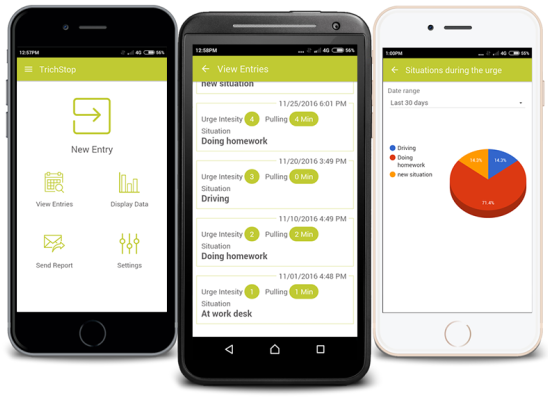Never Too Late: Hope for Recovery from Trichotillomania

Online test
Find out the severity of your symptoms with this free online test
Is it too late for me?
If you've quietly struggled with trichotillomania for years or even decades, it’s a question you’ve probably asked yourself. Dealing with something for so long can leave you feeling defeated and maybe even skeptical as to whether there is truly hope for healing.
One of the most persistent myths about trichotillomania, commonly known as hair pulling disorder or simply trich, is that if it doesn’t resolve early in life, it will persist into adulthood becoming a lifelong struggle and resistant to treatment. This simply isn't true. While trich often emerges during late childhood or early teen years, countless people have found healing and recovery well into their adult lives. And you can too.
Confronting the "Too Late" Myth
Many adults with trich carry the feeling that they’ve somehow missed their window for help. While this feeling is understandable, it’s based on misconception rather than reality.
The fact is, the brain is an extraordinary and dynamic organ. The brain maintains neuroplasticity throughout life. It is continually forming new neural pathways and learning and adapting to new patterns of behaviors. In other words, it’s always learning and rewiring itself. And what is learned can be unlearned. The same neurological mechanisms that allowed your hair pulling to develop can be used to create healthier ways of coping and reduce hair pulling over time.
Recovery stories abound. Some people sought treatment in their 30s after decades of private struggle and made significant improvements. People in their 40s, 50s, and beyond have found healing and recovery. For some, it was their first experience with therapy. For others, it took multiple tries and a combination of approaches. The point is, you can find healing at any age.
Why Seeking Help Later Can Actually Have Advantages
They say with age comes wisdom and it’s true. While early treatment has been linked to positive treatment outcomes, seeking help as an adult brings unique strengths to the recovery process.
- Adults bring experience and insights that a younger person may not have yet.
- Adults tend to have better awareness of their triggers and patterns.
- And along the way, you’ve probably developed some effective coping strategies, even if they don’t provide sustained relief.
In addition to experience, as an adult you have the advantage of autonomy. You can research options and choose the treatment approaches, strategies, and providers that feel right for you.
Practical Tips for Seeking Help at Any Age
The idea of seeking help, whether it’s your first time or you’ve tried multiple times, can feel overwhelming. Here are some tips to help you get on the path to healing.
Find Your Therapist
Once you make the decision to seek help, the next step is to find a therapist. An online search can help you find therapists near you, but it doesn’t end there.
- Look for therapists who specifically mention experience with BFRBs (body-focused repetitive behaviors) or trichotillomania, and approaches such as Habit Reversal Training (HRT), Acceptance and Commitment Therapy (ACT), Dialectical Behavior Therapy (DBT), or Cognitive Behavioral Therapy (CBT).
- If you feel comfortable doing so, ask your medical provider for recommendations.
- Consider both in-office and telehealth options. This can broaden your access to the type of specialist you’re looking for. And online therapy means more flexibility in scheduling.
Don’t Be Afraid to Try Again
Even if you’ve not found success with treatment in the past, it does not mean you're "untreatable" or that recovery isn't possible. The understanding and treatment of BFRBs has changed considerably in recent years resulting in better treatment options and outcomes.
You have changed over time too. You’ve had experiences that have shaped who you are now. You may feel ready to commit to the process. Maybe you have supports and resources you didn’t have before. Even your previous experience with therapy can help you, providing insight into what didn’t work so well for you and what might now.
Build A Support System
Recovery is never a straight line, even though we’d like it to be. And having people to count on for support is an essential piece of the healing process. Support will look different for everyone. It might mean enlisting the support of a trusted friend or family member. It might be connecting with an online BFRB support group or forum with people who understand your experience. Support is about having people in your life who care about your well-being and bring positivity to your life in some way.
Embrace The Process
Recovery is a journey and it’s one that unfolds on its own timeline. Some people experience improvement rather quickly. For others, progress comes slowly over time.
It’s important to know that the road to recovery is not a straight line. It’s more like a winding road with curves and bumps you don’t always see coming. By no means does that mean failure. On the contrary, these bumps are part of the healing process. When they happen, you and your therapist can work through them, learn from them, and continue on your journey.
Whether you progress quickly or slowly, the key to healing is consistency and continuing to move forward, even when progress feels slow.
Next Steps
The bottom line is, whether you’re 16 or 60 (or beyond), whether you’re new to therapy or you’ve tried multiple times, it’s never too late to seek help. Healing starts with that flicker of hope.
Your story of recovery can begin today. If you’re ready to take the next step, Trichstop is here to help. We have a team of experienced therapists who can help, whatever age you are, wherever you are in your journey. It's never too late to seek the help you deserve.
References
1. https://www.reddit.com/r/trichotillomania/comments/1f5h2tf/therapist_told_me_trich_never_goes_away/
2. Aslan, M., Hocaoğlu, Ç., Yüksel, D., & Dilek, N. (2018). Very late onset "Trichotillomania": A case report. Meandros Medical and Dental Journal, 19(4), 360-364. https://www.researchgate.net/publication/330346794_Very_Late_Onset_Trichotillomania_A_Case_Report
3. Pereyra AD, Saadabadi A. Trichotillomania. [Updated 2023 Jun 26]. In: StatPearls [Internet]. Treasure Island (FL): StatPearls Publishing; 2025 Jan-. Available from: https://www.ncbi.nlm.nih.gov/books/NBK493186/
4. https://www.youtube.com/watch?v=hJTr6na5f4Q
Online test
Find out the severity of your symptoms with this free online test
Start your journey with TrichStop
Take control of your life and find freedom from hair pulling through professional therapy and evidence-based behavioral techniques.
Start Now



